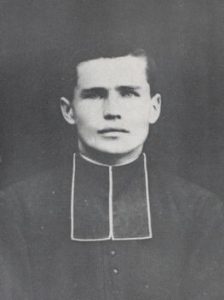Words on the Word
3. Sunday of Advent
Zephaniah 3:14-18a: The Lord your God is your midst, a victorious warrior.
Philippians 4:4-7: Rejoice in the Lord always.
Luke 3:10-18: He will baptise you with fire.
The Church’s two foremost solemnities, Easter and Christmas, are prepared by periods of waiting, thank God. Human beings need lots of time. If our hearts are to enter into, and be transformed by, deep experience, the terrain must be readied first. To make this point is countercultural. Our times prefer what is instant. It appeals to sentiment rather than to thought. Thoughts must be worked out. Feelings can simply be awakened. However, the traces they leave are superficial, and  they change rapidly: this we ascertain daily. As a result, the human heart is often undernourished. Christmas is reduced to sentimentality. What matters is the atmosphere created by tastes and smells, Christmas lights, seasonal entertainment, not to mention all the stuff we don’t need which we’re told to buy. A secular Christmas is an orgy of shopping. But no one can shop away an inner void.
they change rapidly: this we ascertain daily. As a result, the human heart is often undernourished. Christmas is reduced to sentimentality. What matters is the atmosphere created by tastes and smells, Christmas lights, seasonal entertainment, not to mention all the stuff we don’t need which we’re told to buy. A secular Christmas is an orgy of shopping. But no one can shop away an inner void.
In the Church we operate different. Let’s keep on doing that. Advent, like Lent, is a time for recollection. As always, the Church prepares for what lies ahead by looking back. We believe that life has meaning and that it unfolds according to a pattern. It matters, then, to study the map, a habit we’re unused to, guided as we are by the magic of the GPS from one moment to the next, without needing to remember where we come from or where we’re bound. We gladly let ourselves be led by a dead signal which speaks to us with a reassuring voice, as if it were alive.
A bit beyond halfway house in Advent and Lent, the liturgy gives us respite. It is as if, on our way, we’d reached a scenic site. Here we’re invited to rest a little, while enjoying the perspective before us. The fourth Sunday of Lent is such a point, likewise the third Sunday of Advent. We call this day Gaudete Sunday after the introit of the Mass. We hear its text again in the second reading: ‘Rejoice in the Lord always! Again I say, rejoice! The Lord is near. Do not be anxious.’
We may ask: Have we in fact got much to rejoice about? Omicron has caused Covid to flare up again, even in this country where, a few months ago, we cheerfully proclaimed the pandemic to be over. This autumn’s COP26 convention in Glasgow revealed that the climate crisis is worsening and, at at the same time, that the world is uninclined to do anything about it. When the choice is posed between economic growth and ecological sustainability, the dies are cast, whatever woolly rhetoric is used to make the announcement. War drums are heard at night in many places across the world, even in Europe. In the Church we are confronted with scandals, broken promises, apostasy. And in the middle of all this we are to ‘rejoice’? Isn’t this an outrageous capitulation to sentimentality, calling on us to be happy while the world goes under?
No it isn’t. I’d like to explain why not. The joy Paul speaks about – and the concomitant peace ‘beyond understanding’ – is no sentiment. The joy and peace we’re talking about are expressions of the recognition that what I am living through now, even when it hurts, is embraced by a greater reality, an almighty benevolence, which gives meaning to suffering. The light shines in darkness, remember. When Israel stood on the threshold of the Promised Land after forty years in the wilderness, a period marked by uncertainty, fear, and disappointment, Moses said: ‘you have seen how the Lord your God bore you, as a man bears his son, in all the way that you went until you came to this place’ (Deuteronomy 1:31). To be conscious of being carried thus is joy, even when I, while being carried, encounter hardship. I think most of us can confirm this Biblical affirmation on the basis of our own lives, from experience.
When Paul exhorted the Philippians, ‘Rejoice!’, he was in prison. Martyrdom was drawing near. His gaze was fixed on Christ’s cross. In the same letter he writes about the Son of God who ’emptied himself and became obedient unto death, even death on a cross’. Paul is, on the whole, quite unsentimental, yet he is a man full of joy. If we read his letters carefully, this fact is  obvious. It is possible to contemplate the cross and at the same time to know joy deeply, to be established in deep peace. The Carthusian Dom Augustin Guillerand once wrote to someone who was sorely tried (being himself a man acquainted with pain) that the Christian’s great task is to take up his or her own cross ‘with a smile’. ‘Not that we smile at the cross’, he hastened to add, for that would be perverse; ‘but we smile at the One who walks and carries with us.’
obvious. It is possible to contemplate the cross and at the same time to know joy deeply, to be established in deep peace. The Carthusian Dom Augustin Guillerand once wrote to someone who was sorely tried (being himself a man acquainted with pain) that the Christian’s great task is to take up his or her own cross ‘with a smile’. ‘Not that we smile at the cross’, he hastened to add, for that would be perverse; ‘but we smile at the One who walks and carries with us.’
Throughout Advent we are mindful that the Lord comes to our aid. Had we not needed his aid, he would not have come. That the world, surrendered to itself, falters should not surprise us. Our Saviour comes. Do we let ourselves be saved? If so, we must prepare his path. John teaches us how. Share what you have with the needy: teach your heart to be vulnerable and merciful. Conduct your task with justice: be conscious of what is right, not just for yourself, but for your neighbour near and far. ‘Be content with your salary’. That’s a difficult one. One who has something wants more, not just materially. If we’re safe, we want to eliminate risk altogether. If we’re healthy, we want a guarantee that we’ll never be sick. Our post-Christian society has constructed itself in such a way that it tries to be its own saviour. The Bible tells us this is an illusion, a project neither possible nor desirable, a source of neither peace nor joy. True joy, joy that makes life worth living, and the peace that comes in tandem with it (for the two travel together) does not spring from a risk-free existence but from being carried in God’s embrace. God has sent tidings of joy ‘to the poor’. To receive these tidings as ours, we must relinquish our riches, in other words, the safety we seek in our own means. If we do, God can act freely. We in turn discover a new freedom, hitherto unknown. It’s a strange business, but that’s how it is. To be a Christian is to assume risk responsibly; to put one’s trust in God and not in oneself. Then joy’s floodgates burst open.
